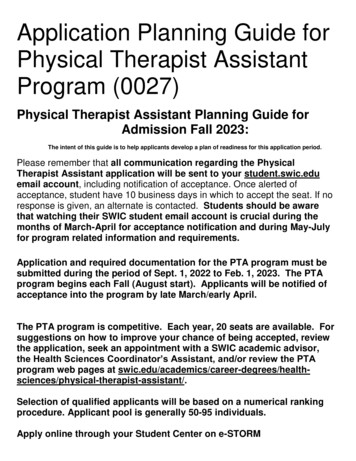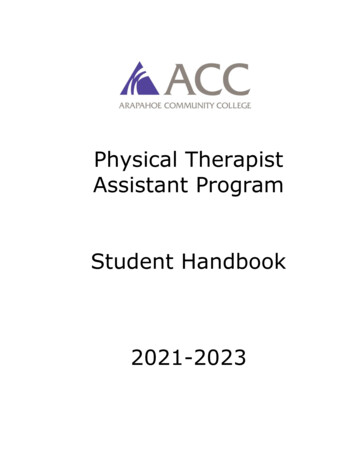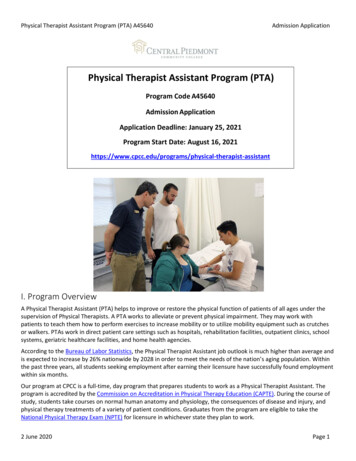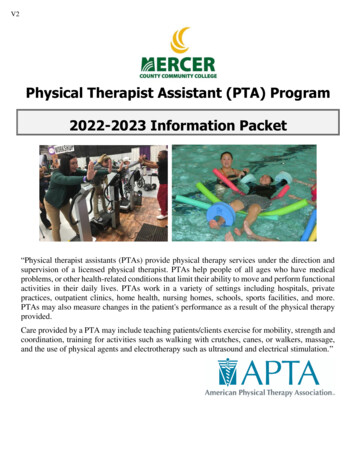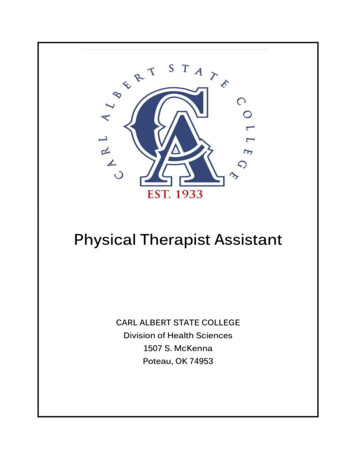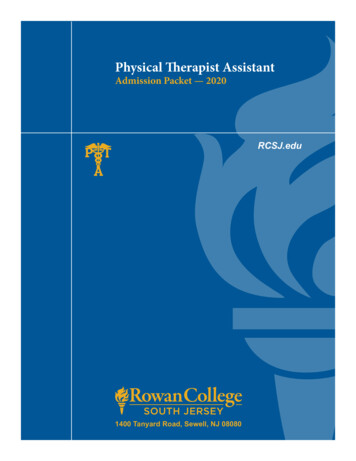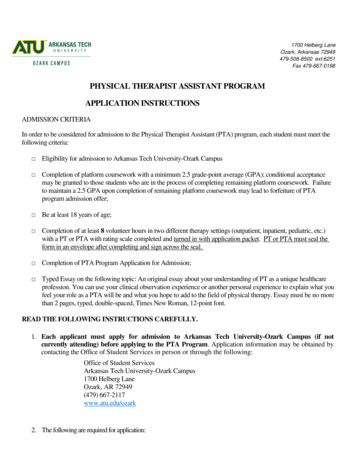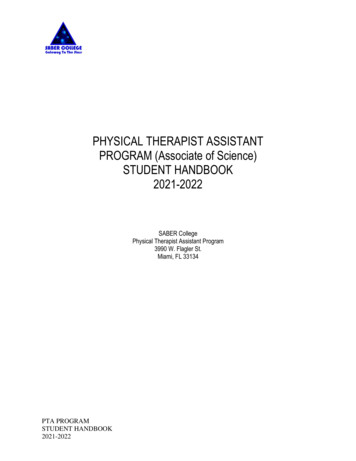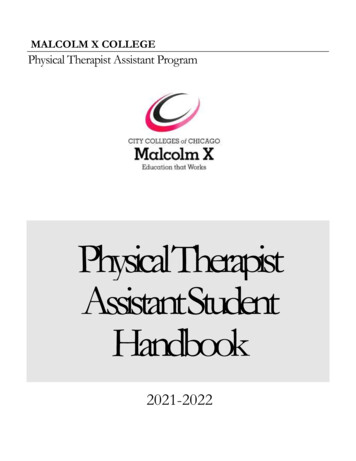
Transcription
MALCOLM X COLLEGEPhysical Therapist Assistant 21-2022
MALCOLM X COLLEGEPhysical Therapist Assistant Program1900 W. Jackson St.Chicago, IL 60612
Table of ContentsTable of Contents iWELCOME AND INTRODUCTION 1PROGRAM INFORMATION 2ACCREDITATION 2Higher Learning Commission (HLC) 2Commission on Accreditation in Physical Therapy Education (CAPTE) 2File a Complaint 2Maintenance of Accreditation 2FACULTY, ADMINISTRATION, AND STAFF 3PTA FACILITIES 4MISSION STATEMENT 4EDUCATIONAL PHILOSOPHY 4PROGRAM STUDENT LEARNING OUTCOMES 6INSTRUCTIONAL METHODS 6PROGRAM OUTCOMES 7APTA and IPTA STUDENT MEMBERSHIPS 7LIABILITY INSURANCE 7SPECIAL SERVICES: STUDENTS WITH DISABILITIES/ACCOMMODATION 7ADMISSIONS 7PROGRAM COSTS 8CURRICULUM SEQUENCE 9COURSE DESCRIPTIONS 10CAMPUS POLICIES & PROCEDURES 14Equal Opportunity in Employment, Programs, Services & Activities 14Non-Discrimination Policy & Statement 15Campus Safety and Security 15Smoke Free Campus 15Drug and Alcohol-Free Campus 15Violence Free Educational and Learning Environment 16Identification Badges 16STUDENT SERVICES 17VIRTUAL STUDENT SERVICES 17ADVISING 17ATHLETICS 17
CTA U-PASS 17CAREER PLANNING AND PLACEMENT CENTER 17DISABILITY ACCESS CENTER (DAC) 17FINANCIAL AID 17FITNESS CENTER 17LIBRARY (CARTER G. WOODSON LIBRARY) 17REGISTRAR 17STUDENT CLUBS, GROUPS, AND ORGANIZATIONS 18STUDENT GOVERNMENT ASSOCIATION 18STUDENT SERVICES 18TESTING RESOURCES CENTER 18TEXTBOOKS (Barnes & Noble) 18TRANSFER RESOURCE CENTER 18TRIO STUDENT SUPPORT CENTER 18ACADEMIC SUPPORT CENTER 18VETERANS SERVICES 19WELLNESS CENTER 19PTA PROGRAM POLICIES AND PROCEDURES 20PROGRAM EXPECTATIONS 20OUTSIDE EMPLOYMENT 20ESSENTIAL PHYSICAL AND PSYCHOLOGICAL PERFORMANCE REQUIREMENTS OF THE PHYSICALTHERAPIST ASSISTANT 20STANDARDS OF ETHICAL CONDUCT OF THE PTA 22VALUE BASED BEHAVIORS 22ACADEMIC DISHONESTY 22STUDENT FILES AND CONFIDENTIALITY 22CHANGE OF PERSONAL INFORMATION 22HEALTH INSURANCE 23PHYSICALS AND VACCINATIONS 23TB TESTING 23CPR 23DRUG SCREENING AND CRIMINAL BACKGROUND CHECKS 24ATTENDANCE POLICY 24Attendance Policy Addition due to COVID-19 25Attendance Expectations specific to Hybrid Learning 25INCLEMENT WEATHER POLICY 25
MAKE-UP WORK 25LATE ASSIGNMENTS 26GRADING POLICY AND MAINTAINANCE OF GOOD ACADEMIC STANDING 26SUSPENSION 26WITHDRAWL 26DISMISSAL 26DISCIPLINARY ACTION: ORAL AND WRITTEN WARNINGS 27DISCIPLINARY HEARINGS AND APPEALS PROCESS 27READMITTANCE 27Students Dismissed from the Program 27Withdrawal, Suspension or Failure to Progress 27Veteran’s Readmission Policy 27WRITTEN EXAMINATIONS AND REMEDIATION 28LAB PRACTICAL EXAMINATIONS AND REMEDIATION 28SKILL COMPETENCY CHECKS AND REMEDIATION 28SKILL COMPETENCY TIMETABLE 28GRIEVANCE PROCEDURES 30COMPLAINTS 31Non-Academic Formal Complaint Filing Procedure 31Procedure for Filing a Formal Non- Academic Complaint 31Oversight of Complaint Management System 31DRESS CODE 31CLASSROOM/LABORATORY SAFETY AND ETIQUETTE 32HAZARDOUS MATERIAL OR BODILY FLUID EXPOSURE 33MEDICAL EMERGENCIES 33FOOD AND BEVERAGES 33CELL PHONE USE 33RECORDING DEVICES 34SOCIAL MEDIA 34ELECTRONIC COMMUNICATION 35PATIENTS/HUMAN SUBJECTS 36CLINICAL EDUCATION 37INTRODUCTION 37DEFINITIONS, ROLES, AND RESPONSIBILITIES IN CLINICAL EDUCATION 37PARTICIPATION 38CLINICAL EDUCATION IN THE CURRICULUM 38ESTABLISHING CLINICAL EDUCATION EXPERIENCES 39
CLINICAL EDUCATION SITE SELECTION 39PREPARING FOR CLINICAL EDUCATION 39Eligibility Requirements 39Student Health Coverage Insurance 40Student Malpractice/Liability 40COVID-19 Vaccination 40CLINICAL EDUCATION ATTENDANCE POLICY 41DRESS CODE 41HAIR, NAILS, JEWELRY, TATTOOS, PIERCINGS AND HYGIENE 42TRANSPORTATION, MEALS, LODGING 42DRUG AND ALCOHOL POLICY 42Prescription Drugs 42VIOLENCE FREE EDUCATION AND LEARNING ENVIRONMENT 43USE OF CELL PHONE, INTERNET, and SOCIAL MEDIA 43CONFIDENTIALITY 43PATIENT RIGHT TO REFUSE 43ACCIDENT AND INJURIES 43INCIDENT REPORTING 43SITE VISITS 43GRADING 43GRADING POLICY AND MAINTENANCE OF GOOD ACADEMIC STANDING 44EARLY TERMINATION OF CLINICAL EDUCATION EXPERIENCES 44REMEDIATION OF CLINICAL EXPERIENCES 44SUSPENSION 45WITHDRAWAL 45DISCIPLINARY HEARINGS AND APPEALS PROCESS 45READMITTANCE 45FORMS 46PHOTO/VIDEO RELEASE FORM 47ESSENTIAL PHYSICAL AND PSYCHOLOGICAL PERFORMANCE REQUIREMENTS OF THE PHYSICALTHERAPIST ASSISTANT 48SKILLS COMPETENCY CHECK REMEDIATION FORM 51LAB PRACTICAL REMEDIATION FORM 52INFORMED CONSENT 53Student to Act as Simulated Patient 53AGREEMENT TO ABIDE BY PTA PROGRAM MANUAL FOR CLASSROOM, LABORATORY, ANDCLINICAL EDUCATION 54
Progressive Discipline Warning Form 55
P H Y S I C A LT H E R A P I S TA S S I S T A N TP R O G R A MWELCOME AND INTRODUCTIONIt is my pleasure and honor to warmly welcome you into the Physical Therapist Assistant (PTA) program at Malcolm XCollege. Your acceptance into this rigorous program demonstrates that you have the academic and professional skillfoundations to become a caring and competent entry-level PTA. The faculty look forward to helping you reach your goalof becoming a physical therapist assistant.As you begin your academics in the technical year of the PTA program, familiarize yourself with the guidelines, policies,procedures, and regulations found in this manual. Clear understanding of the contents of this manual set the expectationfor this year of study. The faculty and college are here to support you in every way possible and are confident you will excel.Together, let’s exceed the expectation!Best wishes,Erin DiCapoProgram Director, PTA Program1
PROGRAM INFORMATIONACCREDITATIONHigher Learning Commission (HLC)Malcolm X College is accredited by the Higher Learning Commission, North Central Association. The HigherLearning Commission is recognized by the U.S. Department of Education and the Council on Higher EducationAccreditation.Commission on Accreditation in Physical Therapy Education (CAPTE)The Physical Therapist Assistant Program at Malcolm X College is accredited by the Commission onAccreditation in Physical Therapy Education (CAPTE), 1111 North Fairfax Street, Alexandria, Virginia 22314;telephone: 703-706-3245; email: accreditation@apta.org; website: http://www.capteonline.org. If needing tocontact the program/institution directly, please call 312-850-7021 or email edicapo@ccc.edu.File a ComplaintCAPTEInformation regarding submitting a complaint to CAPTE can be found here.MALCOLM X COLLEGEComplaints and/or compliments can be submitted here.Maintenance of AccreditationThe program director is responsible for maintenance of accreditation standards with support from program core faculty andcollege administration.2
DAN HONAN, DPTAdjunct Instructordhonan@ccc.eduFACULTY, ADMINISTRATION, AND STAFFERIN DiCAPO, DPTProgram DirectorFacultyOffice # 2103C312-850-7021edicapo@ccc.eduANDREIA LEON, DPTAdjunct Instructoraleon124@ccc.eduSEAN McINERNEY, DPTAdjunct InstructorSmcinerney1@ccc.eduHANNAH TULCHINSKY, DPTAcademic Coordinator of Clinical EducationFacultyOffice # 2103-003312-850-7204htulchinsky@ccc.eduRAMIL MENDOZA, DPTAdjunct InstructorRmendoza137@ccc.eduVALERIE BAEZA, PTAAdjunct Instructorvbaeza3@ccc.eduKATLIN MILLIN, DPTAdjunct Instructorkmillin@ccc.eduLEANNA BLANCHARD, DPTVocational LecturerLblanchard6@ccc.eduDANILYN NGUYENAdjunct InstructorDnguyen115@ccc.eduDANIEL CAPPARELLI, DPTAdjunct Instructordcapparelli1@ccc.eduBERENICE GALVEZ SOTO, PTAAdjunct Instructorbgalvezsoto@ccc.eduBRIDGET GUMINIAK, PTAAdjunct Instructorbguminiak@ccc.eduROY WALKERDean, Health Sciencesrwalker59@ccc.eduWALTER GUMINIAK, PTAAdjunct Instructorwguminiak@ccc.eduJARED DEANE, PhDAssociate Dean, Health Sciencesjdeane@ccc.eduKRISTIN HOFER, DPTAdjunct Instructorkhofer@ccc.eduPRINCESS PHILLIPS and JAQUELINE BELL-SMITHAdministrative Assistantspphillips4@ccc.edujbell-smith@ccc.edu3
PTA FACILITIESThe Malcolm X PTA program laboratory is located in room 2208/2209. Classroom assignments will vary for classes fromsemester to semester depending on the size and needs of the course. In addition, the PTA program with utilize theExercise Science and Sports Studies Laboratory in room 1204 and Virtual Hospital located on the 8th floor of the HealthSciences Tower throughout the technical year of the program.MISSION STATEMENTThe physical therapist assistant program at Malcolm X College, a contemporary institution, offers an innovative andcareer-focused education to students of diverse backgrounds. The program aspires to equip learners with thecompetencies to become licensed physical therapist assistants committed to excellence and caring in clinical practiceand inspired to respond to the needs of a dynamic society.The PTA Program Mission Statement is grounded in the Institution’s Mission, Vision and Goals, which can befound here.EDUCATIONAL PHILOSOPHYThe physical therapist assistant program at Malcolm X College is built around an integration of educationalphilosophies including adult learning, social cognitive, and constructivist learning theories. These models provide afoundation for the design of the physical therapist assistant curriculum. The faculty believes that the integration ofthese models of education reflect the mission of the college to empower its diverse student body to achieveacademic, career, and personal success. Further, these learning theories support critical thinking and facilitatereflection to further knowledge and skill acquisition both of which are necessary in an ever-changing healthcareenvironment. The following summarizes these learning theories and reflects the blending of these theories as abasis for support of the physical therapist assistant student and the largely team-based learning model employedwithin the physical therapist assistant curriculum.ADULT LEARNING THEORYIn Malcolm Knowles’ (Knowles, 1980) comparison of andragogy and pedagogy, he relays several assumptions ofthe adult learner; namely, increased internal motivation, ability to self-direct learning, and reflection and integrationof life experiences in the learning process. Knowles further highlights the adult learner’s need for the utility ofeducation (i.e. the ability to apply knowledge in a timely fashion) and the readiness for learning as social or life roleschange. Adult learning theory places the student at the center of the educational experience. Physical therapistassistant students often present with a wealth of life experiences, as many students are older, may be changingcareer paths, or in the case of students at Malcolm X College, come from diverse urban backgrounds. Using teambased learning methods in the physical therapist assistant curriculum promotes a student-centered approach as theinstructor takes on a facilitator role filling gaps in foundational knowledge rather than re-teaching elementaryconcepts that may be learned independently. Knowles’ adult learning theory is most criticized for the assumptionthat the adult learner possesses the skill set to be a self-directed learner. To this end, the college along with thedesign of the physical therapist assistant program offer student services to support the increased ownership oflearning.SOCIAL COGNITIVE THEORY4
Albert Bandura’s social cognitive theory stands as one of the leading learning theories emphasizing that muchlearning is observational and dependent on the environment, behavior, and personal factors. Bandura relates thathow an individual processes and perceives the outcome of experiences largely influences learning and engagementin subsequent behavior; a term he refers to as self-efficacy. Two sequential processes influence self-efficacy:efficacy and outcome expectations. Efficacy expectations refer to the belief that the learner can perform a specificaction. Outcome expectations refer to the belief that the action will then lead to desired results. To promotesuccessful learning of the student, knowledge application and skill acquisition will follow a structured approachimproving the concept of self-efficacy as more basic knowledge and skills build in complexity throughout the PTAcurriculum. Bandura also proposes that much of learning evolves from modeling and imitation of those with whichthe student has a connection (i.e. peers and faculty). (Bandura, 1977; Bandura & McClelland, 1977)Through team-based learning methods and an emphasis on laboratory learning, the PTA curriculum will emphasizeboth peer and faculty mentorship.CONSTRUCTIVIST LEARNING THEORYJerome Bruner’s constructivist learning theory emphasizes learning as an active process wherein the learning occursas the student creates new understandings based on past knowledge and experiences. In this way, all learningshould build in an upward process so that the growing complexity of mental models built allows the learner todevelop a sound frame of reference for problem solving in novel situations and contexts. The PTA curriculum atMalcolm X College supports the constructivist learning theory in several ways. First, the one plus one model of theprogram provides a strong foundational base in anatomy, kinesiology, and the fundamentals of exercise, generalpatient care, and navigation within the healthcare system in the first year of the curriculum. Secondly, upon entryinto the technical and final year of the PTA program, importance is placed on best learning strategies incorporatingactive study skills, varied practice, and interleaving material to best retain knowledge and skills in the long-term(Dunlosky, Rawson, Marsh, Nathan, & Willingham, 2013). Lastly, by nature of team-based learning, the principlesof the constructivist learning theory are met; namely, assessing student readiness, providing increasingly complexactive learning experiences, and faculty facilitation to recognize and fill in gaps of knowledge for the students(Jerome Seymour Bruner, 1966; Jerome S Bruner, 2009). Peer learning and facilitation of learning by the facultyfurther promotes exposure to others mental models to strengthen a student’s ability to critically consider choices indecision-making.REFERENCESBandura, A. (1977). Self-efficacy: toward a unifying theory of behavioral change. Psychological review, 84(2), 191.Bandura, A., & McClelland, D. C. (1977). Social learning theory.Bruner, J. S. (1966). Toward a theory of instruction (Vol. 59): Harvard University Press.Bruner, J. S. (2009). The process of education: Harvard University Press.Dunlosky, J., Rawson, K. A., Marsh, E. J., Nathan, M. J., & Willingham, D. T. (2013). Improving students’ learningwith effective learning techniques promising directions from cognitive and educational psychology.Psychological Science in the Public Interest, 14(1), 4-58.Knowles, M. (1980). The modern practice of adult education. Chicago, IL: Association: Follett Press.5
PROGRAM STUDENT LEARNING OUTCOMESUpon completion of the physical therapist assistant program students/graduates will:1. Students/graduates will develop knowledge and clinical skills congruent with that of an entry-level therapist.2. Demonstrate critical reasoning skills to progress, modify, or regress physical therapy interventions within thescope of practice of the PTA.3. Integrate evidence based and best practice to make clinical decisions.4. Respond appropriately to maintain patient safety in all situations.5. Design career development plans to maintain contemporary practice and state licensure.6. Demonstrate respect for self and others of diverse backgrounds.7. Utilize effective and non-judgmental written and verbal and non-verbal communication in interactions withpatients, caregivers, peers, colleagues, and the community.8. Demonstrate ethical behavior in adherence to all appropriate laws, policies, and procedures including scopeof practice of the PTA.9. Enhance the health and well-being of their community through commitment to social awareness andadvocacy for primary and secondary disease prevention.INSTRUCTIONAL METHODSThe PTA program at Malcolm X College uses a variety of instructional methods following evidenced-based andbest practices in education placing the student at the center of the learning experience. The majority of thecurriculum utilizes a team-based learning (TBL) approach with a large amount of class and laboratory time devotedto developing hands-on skills. Team based learning requires the individual student to prepare before class. Preclass assignments are designed to build foundational knowledge through selected readings, reviewing lectures onBlackboard, and other appropriate activities. Pre-class preparation in turn frees class time for more extensivediscussion and application activities instead of building foundational knowledge. TBL also places a value on preclass preparation. During the beginning of each class, an initial individual readiness assurance process (RAP),typically in the form of a quiz, is given. The identical RAP is given to the team following the individual quiz.During the team RAP, there is time to debate, further foundational knowledge understanding and comprehensionwith peers, and reach consensus. Class debate/dialogue and faculty instruction fills identified gaps in knowledgebased on the readiness assurance process. In this way, team based learning epitomizes a student-centered approachto instruction. Application based assignments as teams fulfill a large portion of the instructional time. Teamreporting and instructor summary end each session (which may encompass more than one class period). As thecourse or semester culminates anonymous peer evaluations are completed by each team member (Michaelsen &Sweet, 2011).In addition, some course material will be presented in lecture/demonstration format. Guest lecturers and field tripswill be incorporated to enhance the classroom material. Audio-visual materials will be utilized whenever possible asan adjunct to your learning experience.References1. Michaelsen, L. K., & Sweet, M. (2011). Team‐based learning. New directions for teaching and learning,2011(128), 41-51.6
PROGRAM OUTCOMESThe faculty and college are committed to seeing each student succeed in the physical therapist assistant program. Itis our expectation that you remain enrolled in the program and successfully graduate on time. We have mechanismsin place to provide you with the support necessary to accomplish this goal. If you are having any difficultypersonally or academically, we encourage you to talk to the PTA Program faculty for guidance and assistance. Thecollege offers many resources to promote student success.Please find all program outcomes including graduation rates, National Physical Therapist Assistant Exam (NPTEPTA) pass rate, and employment rates on the PTA Program Website.APTA and IPTA STUDENT MEMBERSHIPSStudents are strongly encouraged to join the APTA and IPTA as student members. There are many membershipadvantages including, but not limited to discounts, aid, insurance benefits, employment resources, access to mostcurrent physical therapy research, news, and publications, and much more
The physical therapist assistant program at Malcolm X College is built around an integration of educational philosophies including adult learning, social cognitive, and constructivist learning theories. These models provide a foundation for the design of the physical therapist assistant curriculum. The faculty believes that the integration of
